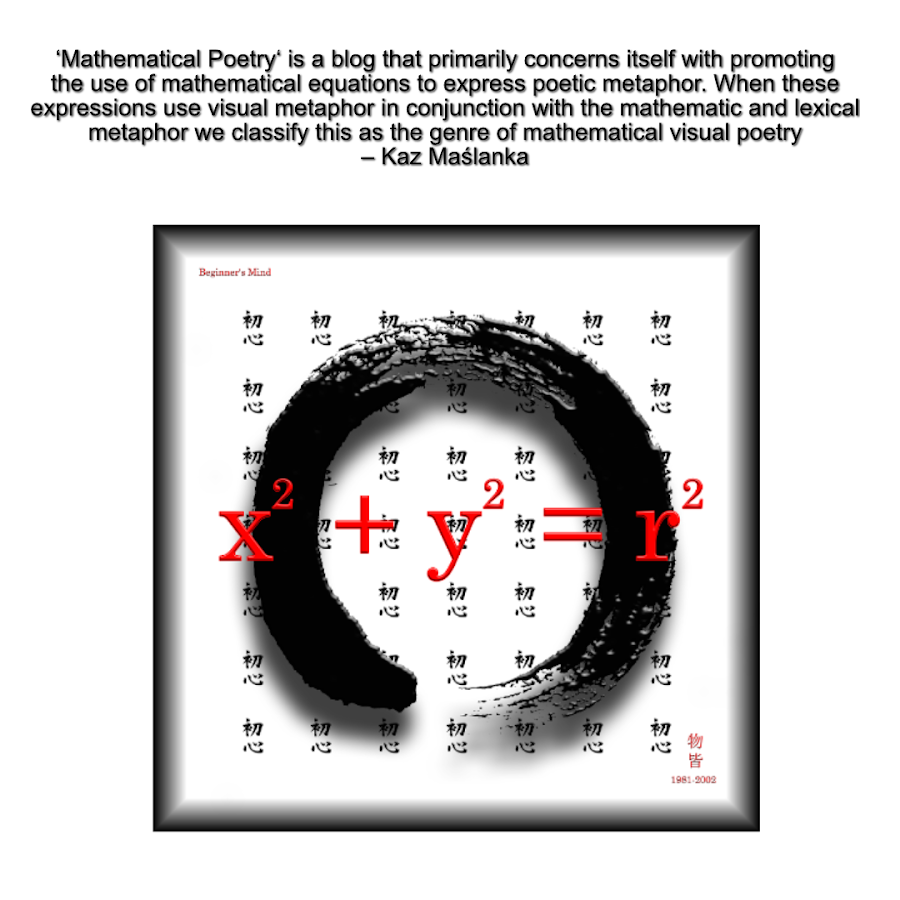Grumman on Schlegel

Bob Grumman has just posted Marko Niemi’s translation of Friedrich Schlegel’s equation for poetry and God on his blog at this URL: click here
Bob has made the following comments:
“This is a translation by Marko Niemi of the 19th-Century German philosopher Friedrich Schlegel’s formula for poetry. Kaz thinks it may be the world's first mathematical poem. I'm not sure. It seems mostly informrature to me--i.e., intended to inform rather than provide beauty, as literature is intended to do (in my poetics). It is a way of mathematically defining something philosophical as e equals mc squared mathematically defines energy, rather than creating a poetic experience. It is entirely asensual--at least for one like me, who has no notion what material feature "God" has. Mathematically, it is a little silly, too--for if "shit" were substituted for "FSM," the equation would be in no way altered. On the other hand, it is a marvelously step toward what Kaz and I and Geof and Karl are doing, perhaps a pivotal one (although I don't know of anyone who was inspired to create mathematical poetry by it).”
I would like to address a few things from his comments.
Bob says, “Kaz thinks it may be the world's first mathematical poem. I'm not sure.”
I would like to note that I doubt that this poem was the first mathematical poem ever written. It is however the earliest mathematical poem that I have seen. I have seen earlier mathematical visual poems but no mathematical poems this early. For an understanding of the difference between mathematical poem and mathematical visual poem, please check my terminology at this link: click here
Bob says, “It seems mostly informrature to me--i.e., intended to inform rather than provide beauty, as literature is intended to do (in my poetics).”
I see this as expressive rather than informative. The question to ask is, “Was Schlegel’s equation meant to be denotative or connotative. It is hard if not impossible to be denotative when you are dividing by zero. Concerning aesthetics, Bob has a very different idea of beauty than I and his views of mythology are very different from mine as well. Bob is certainly entitled to his opinion. Although I also would have to say that Schlegel’s view of God is about as different to my view as mine is to Bob’s. I think the main aesthetical point to Schlegel’s poem is tying “The Transcendent” to an expression of infinity … not just once but six times. There are many things beautiful to mathematicians and infinity is definitely one of them if not the greatest idea of beauty. On the other hand, those who believe in “God” would also believe that the idea of God is the greatest beauty. However, I am certain that my idea of God is heretical to those same believers, for I do not believe in using lower case letters for the ‘G’ in God. All Gods are metaphors to The Transcendent.
Bob says, It is a way of mathematically defining something philosophical as e equals mc squared mathematically defines energy, rather than creating a poetic experience.
Here Bob equates philosophy with science … That was certainly true in 300 BC. However, there is nothing scientific about this equation for a scientist in Schlegel's time would never divide by zero (it is undefined for scientific use but perfect for poetry in fact it is the crux of metaphor)
Here is Schlegel’s view:
“Schlegel argued that poetry should be at once philosophical and mythological, ironic and religious. As a literary critic Schlegel sought not to reveal objective truths, but to write criticism so that the usual discursive prose becomes a work of art itself.” **
Bob says, It is entirely asensual--at least for one like me, who has no notion what material feature "God" has.
I am confused … I do not know where ‘anything’ physical was stated or implied.
Bob says, Mathematically, it is a little silly, too--for if "shit" were substituted for "FSM," the equation would be in no way altered.
The latter statement is another aesthetic judgment and again Bob is entitled to any scatological view he desires ;)
Bob says, On the other hand, it is a marvelously step toward what Kaz and I and Geof and Karl are doing, perhaps a pivotal one (although I don't know of anyone who was inspired to create mathematical poetry by it).”
If Schlegel inspired anyone to write mathematical poetry then Marko Niemi may be the closest person to know for he is our source.
**The quote was taken from this web site: click here



2 comments:
Just now saw this for the first time, Kaz. Was looking for something else, but glad to happen on it, for I'm about to write about the Schlegel, stealing it from you site (if you don't mind), and will quote and respond to what you've said here.
Only one small comment now: that I bring up the lack of sensuality or the physical in the Schlegel because I define beauty as being sensual--yes, my definition, not necessarily the world's. The beauty Russell and others find in math is similar and equal to what I consider aesthetic beauty, but different.
It took you seven years to read my blog? I thought you were interested in this field? Ha!:)
---- Beauty has to be sensual? - So you don't find pure mathematics as beautiful? Or do you find pondering math sensual?
Post a Comment